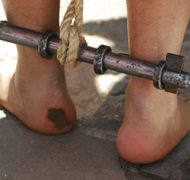Parents: Don’t Shackle Your Children With Vocational Guilt!
Blog / Produced by The High Calling
My grandmother was awesome, the coolest granny in California. She loved parasailing and polar bear swims, and she loved Jesus Christ.
But one day she told us, "My greatest hope is that all of you will grow up to serve the Lord as missionaries and pastors."
She meant well. But her words dumped a crushing load of expectation into the heart of a kid who desperately wanted to please his parasailing granny. My dad wisely pulled me aside and corrected grandma's well-meaning, but misguided, intentions.
What if my dad had agreed with her?
For some people, these wounds run deep. A friend recently told me that his family repeatedly said he should be a preacher. He is not a preacher. He never felt called to be a preacher. Consequently, he spent twenty years doubting the meaning and worth of his marketplace work -- and of his life.
I know all about growing up with this type of expectation of a “call” on my life. When I didn’t hear
this call, I felt everyone’s disappointment. The foundation was laid that I had somehow not measured up to the standard. When I was young I shrugged it off. Now, however, I can see how it loomed large in much of my life.
Parents and grandparents: Do you carelessly imply that pastors are more significant than accountants? Do you hint that CEOs are more successful than carpenters?
We inflict devastating damage with these implications. First, we ignore the biblical doctrine of work that says, in the words of Martin Luther, the works of a pastor “do not differ one whit in the sight of God from the works of the rustic laborer in the field. . . . All works are measured before God by faith alone.” Second, we teach our children that the worth of their lives is based on their job title rather than on the worth and work of Jesus Christ.
Ouch! I preach and write on these topics, yet I easily fall into this trap. How about you? Deep inside, I sometimes hope my kids become CEOs, not carpenters. My hope is wrong! It is twisted by my pride, and this twisted hope inevitably leaks into conversations with my kids. If uncorrected, it will shackle them with lifelong vocational guilt.
As school children, my friends and I laughed at ancient cultures who thought the earth was flat. How could they be such ignoramuses? In our childish immaturity, we were too stupid to realize that some of the greatest minds in human history thought the earth was flat. They weren't ignoramuses; they simply never asked otherwise, because it was an accepted fact. Two plus two is four, fish swim in water, the earth is flat.
When everyone and everything we know -- our books, friends, family, and church -- all say something is true, we tend to shrug and assume it simply must be so. We don't question it -- the earth is flat, Elvis is alive, ministry work is more significant to God than marketplace work. Period.
Some of the greatest minds in church history taught this unbiblical view of work. My parasailing, Jesus-loving grandmother believed missionaries were more significant than truck drivers. Those great minds and my awesome granny simply assumed it was true. Everyone said it, so it must be so.
Today, however, you and I have access to a wealth of information about the biblical doctrine of work. We must extend the hand of grace to those who have gone before us. But we must also break the shackles of vocational guilt for our own children and for generations to come.
Post by Paul Rude, author of Significant Work.
Image by Richard Vignola. Used with permission. Sourced via Flickr.





